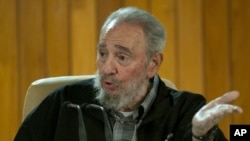In democracy or dictatorship, there may be no secret more closely guarded than the health of the country’s leader. So when world leaders gather for an event like the U.N. General Assembly, intelligence agencies closely watch presidents and prime ministers for any clues as to their true medical conditions.
An ill-timed cough or sudden fever of a president, prime minister, dictator, or monarch can send financial markets into a tailspin, spark a nation to revolution, ignite a succession crisis, or swing an election. Rose McDermott of Brown University, who has extensively researched and written about medical intelligence, says a foreign government can enjoy great political and diplomatic advantage if it can find out the true condition of an ailing world leader.
“It can be decisively important because it can really change the stability of governments, particularly in authoritarian or totalitarian regimes, where there’s really a limited number of people who have powerful decision-making authority. Knowing how sick someone is, what their prognosis is, what their diagnosis is, can give you some information about which horse to back in a particular kind of succession race,” McDermott said.
Deep inside the Central Intelligence Agency is a unit dedicated to uncovering the true physical and mental states of world leaders. The Medical and Psychological Assessment Cell, or MPAC, employs or consults physicians, sociologists, political scientists, and cultural anthropologists to examine the conditions of top officials.
Getting accurate medical intelligence is a daunting task. Dr. Jerrold Post, who in the 1970s founded the CIA unit to conduct psychological analysis of foreign leaders, says leaders feel it necessary to hide their medical conditions to avoid any appearance of weakness.
“One of the things that is important to note is this capacity to conceal. We all want a leader who is all-wise, all-knowing, all-powerful, and the public image of a leader who is quite ailing can lead to as serious diminution in his attractiveness as a leader. And leaders understand this intuitively. So we’ve had some major concealments historically. And that continues to be the case,” Post said.
U.S. President Franklin Delano Roosevelt had not only polio but, during the beginning of his fourth term in 1944, a bad heart that killed him a year later. President Grover Cleveland had secret jaw cancer surgery performed aboard a yacht in 1893. Woodrow Wilson was kept in seclusion after suffering a debilitating stroke in 1919. The failing health of world leaders like the shah of Iran and Philippines President Ferdinand Marcos are more recent examples of official medical secrecy.
Dr. Jonathan Clemente, a physician who is writing a book on medical spying, says in today’s world much can be learned just by close examination of video or photographs, especially high-resolution images.
“Do we see any outward signs of physical disability or disease? Then they will look at video. They will look at how the person holds themselves. How do they walk? Do they have any signs of weakness or limping, their gait? Do they have any difficulty walking? Are they favoring one arm over the other? Or they’ll look at the symmetry of the face. Is there any sign of prior stroke?,” Clemente said.
But if a leader is kept out of sight, intelligence agencies must especially rely on human sources. Fred Burton, vice-president of intelligence for the private strategic risk firm Stratfor, says developing sources to provide intelligence on an official’s medical state is no different than having an agent give the whereabouts of an al-Qaida terrorist or the state of Iran’s nuclear program.
“That could be anything from hospital administrators to nurses to physicians’ assistants to couriers that transmit blood or body fluid for testing. It could be outsourced laboratories. It could be anybody who has capability to access medical records inside of a hospital kind of environment,” Burton said.
Burton says agents will collect medical waste items, which can yield important information about someone’s medical condition.
“No discarded bandage or something like a syringe should be discounted because you can draw DNA and blood types and you can do some examination on the contents of even a discarded band-aid to try to determine perhaps what’s wrong with that person. So, as unseemly as that may sound, this is what intelligence services do,” he said.
Analysts say a leader is especially vulnerable to such remote examination if they go abroad for medical treatment, as many officials do. Dr. Clemente says there have been instances of intelligence agencies trying to secretly obtain bodily fluids for medical examination.
“Then there are sort of apocryphal stories, which I think probably have some truth to it, that they have been able to surreptitiously obtain bodily fluids. And there are sort of several well-known examples of diverting plumbing in [the presidential guest residence] Blair House, or other places abroad where they are able to obtain stool and urine samples. I’ve not been able to find any sort of firm declassified information, but I have from a number of well-placed knowledgeable sources that at least there was some effort to do that,” Clemente said.
Dr. Clemente notes that in making a terminal diagnosis, doctors are taught never to tell someone that they have, say, six months to live. He says the CIA’s analysts in medical intelligence also never make a firm prognosis of life expectancy.
“Similarly, the analysts at MPAC try to avoid making those prognostic statements - ‘Castro’s going to be dead in six months.’ What they try to do is collect facts. And they say, ‘someone with this condition will likely have this course over the time,’” Clemente said.
But even so, such remote examinations can be wildly off. In 2006, then-Director of National Intelligence John Negroponte told the Washington Post newspaper that Cuban leader Fidel Castro was at death’s door and had months, not years, to live. Five years after that pronouncement, Castro is still alive.
Spies Track Physical Illnesses of Foreign Leaders




